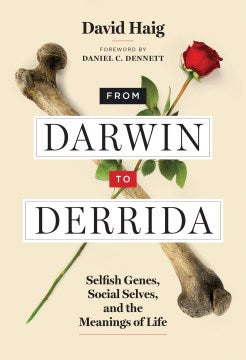
From Darwin to Derrida
Publisher,Mit Pr
Publication Date,
Format, Hardcover
Weight, 544.31 g
No. of Pages, 477
The main task of this book is to explain how the process of natural selection produces purposeful beings that make sense of their world - organisms who do things for good reasons. It provides a link between a physical world described in terms of matter in motion and a living world described in terms of meanings and purposes. David is proposing a unification of biology and the humanities through a shared engagement with questions of purpose and meaning. From the Introduction: Spoken and written language are the expression of deep inner structures. The language that is censored says something about the values and fears of the censor. This book pays close attention to the meanings of words for four main reasons. The first is that languages evolve and provide useful analogies for thinking about genetic evolution. The second is that meaning is the outcome of a process of interpretation and is specific to each interpreter. The same words will be interpreted differently and mean different things for each reader. As a result many acrimonious disputes in the philosophy of biology are really quibbling about definitions rather than disputes about facts. The third is that the origin of language marked an extraordinary expansion in the lexical expressivity of the flux of meaning. The fourth, and most important, is that the beauty and diversity of language, like the beauty and diversity of the natural world, are wonders to behold. Natural selection reuses old materials for new purposes. Its products are thereby comprised of parts of variable age that nevertheless must work together in some more-or-less coherent fashion. The resulting genomes are pastiche and so is this book. Its bricolage extends to the extensive use of quotations and paraphrase. Finally, I believe that the humanities and sciences have much to say to each other, so I wished to express my ideas in a style that would engage both audiences at the risk of enraging both and being ignored by both. Much of the prose was originally written under the constraints of meeting the selective criteria of scientific reviewers, and it shows. But the freedom from these constraints as I have revised the text has been liberating--

